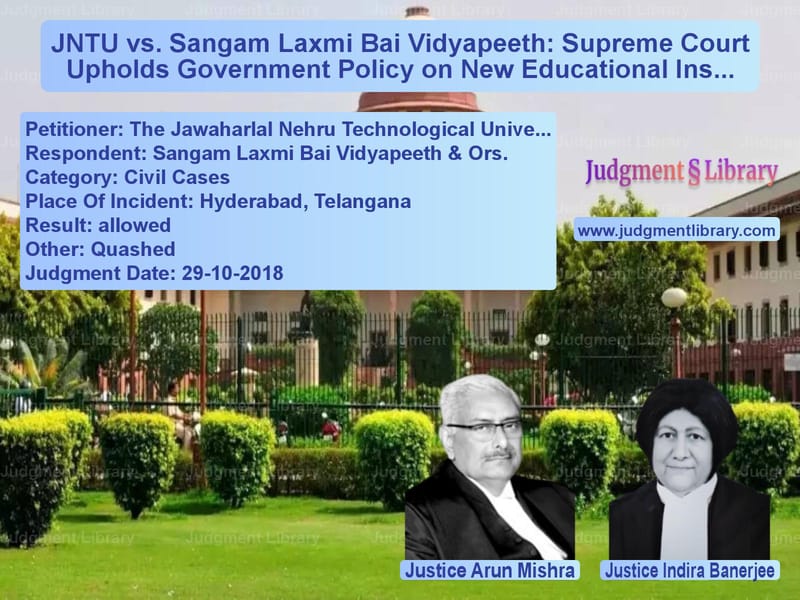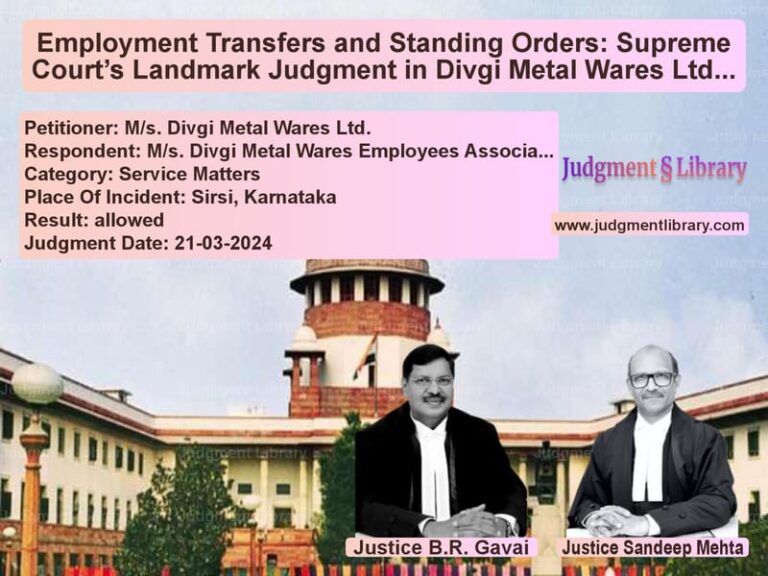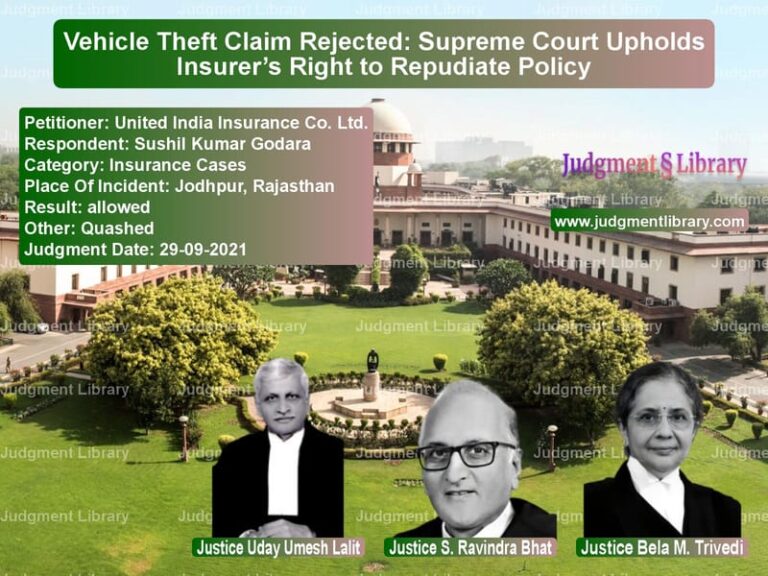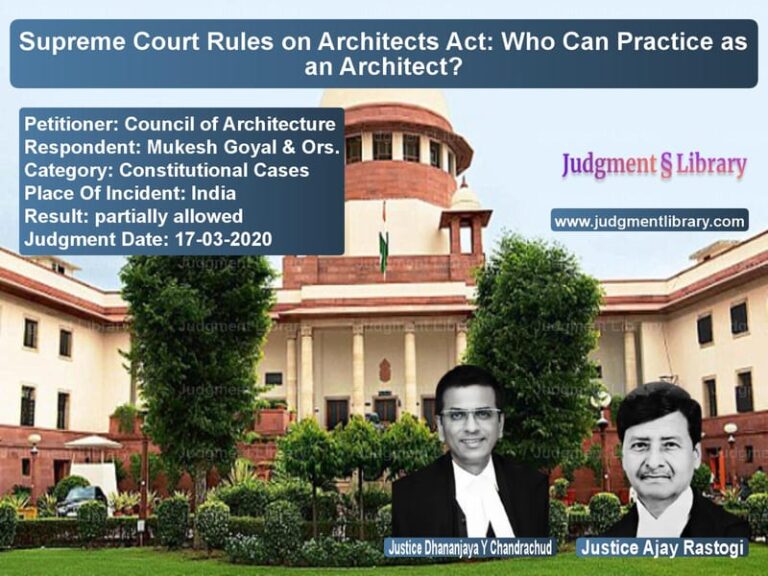JNTU vs. Sangam Laxmi Bai Vidyapeeth: Supreme Court Upholds Government Policy on New Educational Institutions
The case of The Jawaharlal Nehru Technological University Registrar vs. Sangam Laxmi Bai Vidyapeeth revolves around the legal question of whether a university is obligated to grant a No Objection Certificate (NOC) for new educational institutions or courses regardless of the existing educational infrastructure and demand in a particular area. The Supreme Court of India, in its judgment dated 29th October 2018, ruled in favor of the University and the State Government, thereby upholding the policy restricting the approval of new institutions to prevent their uncontrolled proliferation.
Background of the Case
The first respondent, Sangam Laxmi Bai Vidyapeeth, a registered society, manages Bojjam Narasimhulu Pharmacy College for Women in Hyderabad. The society applied to the Jawaharlal Nehru Technological University (JNTU) for an NOC to start a D.Pharma course for the academic year 2018-2019.
However, on 19th August 2017, JNTU denied the NOC citing the Government’s perspective plan and policy decision to restrict the growth of new institutions and courses in the state. The government had previously conducted a survey that highlighted the excessive number of technical institutions and the increasing number of vacant seats in existing institutions.
Proceedings in the High Court
Aggrieved by the denial of NOC, the college approached the Telangana High Court, challenging:
- The university’s decision to deny NOC.
- Regulations 5.1, 5.2, and 6 of the JNTU Affiliation Procedure and Regulations, 2017.
The High Court ruled in favor of the college and directed JNTU to grant the NOC. The court observed that:
- The government’s policy of restricting new institutions and courses based on vacant seats was not justified.
- It was the responsibility of All India Council for Technical Education (AICTE) and Pharmacy Council of India (PCI) to regulate technical education, and the state government could not impose a moratorium on new institutions.
- Market forces would automatically regulate institutions; if there was no demand, institutions would shut down naturally.
JNTU, dissatisfied with this decision, approached the Supreme Court.
Arguments by the Petitioner (JNTU)
JNTU and the Telangana Government put forward the following arguments:
- The state had 30 institutions already offering pharmacy courses in Hyderabad.
- There was a severe shortage of faculty, and granting more institutions would reduce the quality of education.
- The perspective plan prepared by the government identified low demand and excessive vacant seats as key concerns, justifying restrictions on new institutions.
- The government had the right to impose policy-based educational planning under Section 20 of the Telangana Education Act, 1982.
- The High Court exceeded its jurisdiction by interfering in a policy matter that was within the discretion of the government and the university.
Arguments by the Respondent (Sangam Laxmi Bai Vidyapeeth)
The respondents (college management) contended:
- The university’s refusal to grant an NOC was arbitrary and beyond its jurisdiction.
- The AICTE and PCI were the relevant authorities to regulate the number of institutions and courses, not the state government or university.
- Vacant seats in other institutions were not a valid reason to deny new institutions.
- The refusal violated Article 19(1)(g) of the Constitution, which grants citizens the right to practice any profession, trade, or business.
Supreme Court Judgment
The Supreme Court, after careful consideration, ruled in favor of JNTU and the Telangana Government. The key findings included:
- Section 20 of the Telangana Education Act, 1982, allows the government to regulate the number of educational institutions in a particular area based on need.
- The mushrooming of institutions without considering demand would adversely affect education quality.
- The High Court erred in holding that the state could not impose restrictions on new institutions.
- The state had the authority to plan and regulate educational growth to maintain quality standards.
Key Excerpts from the Judgment
The Supreme Court strongly backed the government’s policy and observed:
“The educational needs of the locality are to be ascertained and determined by the State. The competent authority may justifiably refuse to grant an NOC if there are already a large number of institutions imparting education in the area.”
The Court further emphasized:
“The mushroom growth of educational institutions cannot be permitted. The requirement of the locality should exist, and only standard institutions should be allowed to function. A large number of institutions should not be opened up only to die an unnatural death due to lack of demand.”
Final Judgment
The Supreme Court set aside the High Court’s judgment and upheld the Telangana Government’s policy, ruling that:
- JNTU was not obligated to grant an NOC for new institutions or courses.
- The government’s policy decision to restrict new pharmacy colleges in Hyderabad was reasonable and justified.
- Regulations 5.1, 5.2, and 6 of JNTU’s 2017 Affiliation Regulations were upheld.
Legal Precedents and Significance
The judgment aligns with previous Supreme Court rulings that allow states to regulate educational infrastructure growth:
- Government of Andhra Pradesh vs. J.B. Educational Society (2005): Upheld the validity of Section 20 of the Education Act.
- State of Maharashtra vs. Sant Dnyaneshwar Shikshan Shastra Mahavidyalaya (2006): Held that states can regulate the establishment of new educational institutions.
Conclusion
The case of Jawaharlal Nehru Technological University vs. Sangam Laxmi Bai Vidyapeeth establishes a significant legal precedent in regulating educational institutions. It reaffirms the power of state governments and universities to control the expansion of technical and professional colleges based on demand and feasibility. By preventing the indiscriminate growth of institutions, this ruling ensures the maintenance of quality education standards and prevents financial instability in the education sector.
Petitioner Name: The Jawaharlal Nehru Technological University Registrar.Respondent Name: Sangam Laxmi Bai Vidyapeeth & Ors..Judgment By: Justice Arun Mishra, Justice Indira Banerjee.Place Of Incident: Hyderabad, Telangana.Judgment Date: 29-10-2018.
Don’t miss out on the full details! Download the complete judgment in PDF format below and gain valuable insights instantly!
Download Judgment: The Jawaharlal Nehru vs Sangam Laxmi Bai Vid Supreme Court of India Judgment Dated 29-10-2018.pdf
Direct Downlaod Judgment: Direct downlaod this Judgment
See all petitions in Education Related Cases
See all petitions in Judgment by Arun Mishra
See all petitions in Judgment by Indira Banerjee
See all petitions in allowed
See all petitions in Quashed
See all petitions in supreme court of India judgments October 2018
See all petitions in 2018 judgments
See all posts in Civil Cases Category
See all allowed petitions in Civil Cases Category
See all Dismissed petitions in Civil Cases Category
See all partially allowed petitions in Civil Cases Category







